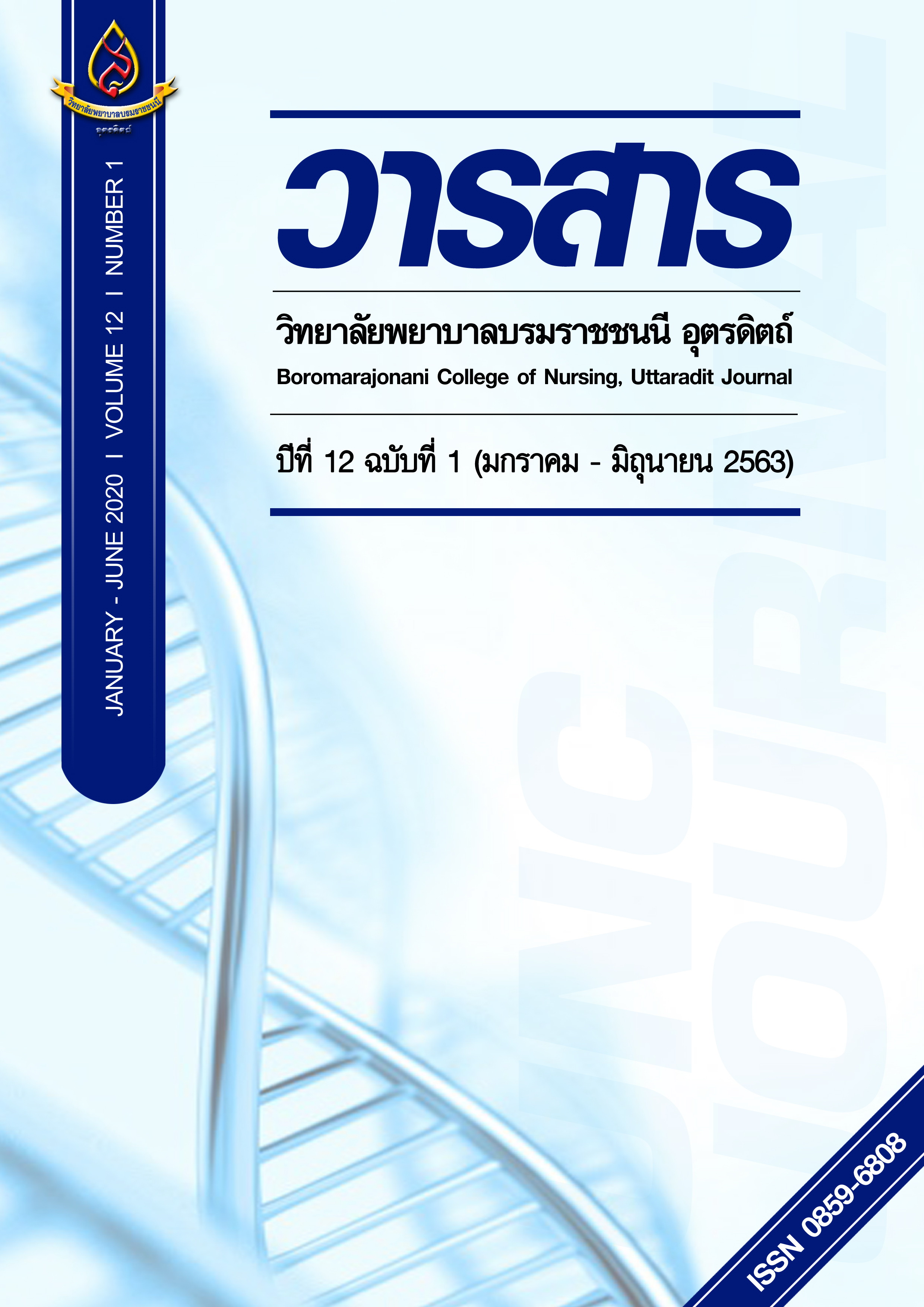ผลของโปรแกรมการสนับสนุนการจัดการตนเองต่อพฤติกรรมการดูแลตนเอง และระดับน้ำตาลในกระแสเลือดในผู้ป่วยเบาหวาน ชนิดที่ 2
Main Article Content
บทคัดย่อ
การวิจัยครั้งนี้เป็นการวิจัยกึ่งทดลอง มีวัตถุประสงค์เพื่อศึกษาผลของโปรแกรมการสนับสนุนการจัดการตนเองต่อพฤติกรรมการดูแลตนเองและระดับน้ำตาลในกระแสเลือดในผู้ป่วยเบาหวาน ชนิดที่ 2 กลุ่มตัวอย่างจำนวน 60 ราย เลือกแบบเจาะจง ตามเกณฑ์และคุณสมบัติคัดเข้า แบ่งเป็นกลุ่มทดลองและกลุ่มควบคุม กลุ่มละ 30 คน กลุ่มทดลอง ได้เข้าร่วมโปรแกรมการสนับสนุนการจัดการตนเอง 10 สัปดาห์ เครื่องมือที่ใช้ในการวิจัย ประกอบด้วย แบบสอบถามเกี่ยวกับลักษณะข้อมูลทั่วไป แบบวัดความรู้เรื่องโรคเบาหวาน แบบสอบถามพฤติกรรมการดูแลตนเอง และแบบบันทึกผลการตรวจระดับน้ำตาลในเลือด วิเคราะห์ข้อมูลโดยใช้การหาค่าเฉลี่ย ร้อยละ ส่วนเบี่ยงเบนมาตรฐาน สถิติ Independent t- test และ Paired t-test
ผลการวิจัยพบว่า หลังการทดลองกลุ่มทดลองมีคะแนนเฉลี่ยความรู้ พฤติกรรมการดูแลตนเองสูงกว่าก่อนเข้าร่วมโปรแกรมฯ และระดับน้ำตาลในกระแสเลือดต่ำกว่าก่อนเข้าร่วมโปรแกรมฯอย่างมีนัยสำคัญทางสถิติที่ p < .05 และมีคะแนนเฉลี่ยความรู้ พฤติกรรมการดูแลตนเองสูงกว่ากลุ่มควบคุมและระดับน้ำตาลในกระแสเลือดต่ำกว่ากลุ่มควบคุมอย่างมีนัยสำคัญทางสถิติที่ p < .05
ผลการวิจัยนี้ ชี้ให้เห็นว่าโปรแกรมการสนับสนุนการจัดการตนเองสามารถทำให้ผู้ป่วยเบาหวานมีความรู้ พฤติกรรมการดูแลตนเองดีขึ้น และระดับน้ำตาลในกระแสเลือดลดลง ดังนั้นสามารถนำไปประยุกต์ใช้ในการดูแลผู้ป่วยเบาหวานต่อไปได้
Article Details
บทความหรือข้อคิดเห็นใดใดที่ปรากฏในวารสารวิจัยการพยาบาลและวิทยาศาสตร์สุขภาพ เป็นวรรณกรรมของผู้เขียน ซึ่งบรรณาธิการหรือสมาคมศิษย์เก่า ไม่จำเป็นต้องเห็นด้วย และบทความที่ได้รับการตีพิมพ์เผยแพร่ถือเป็นลิขสิทธิ์ของวารสารวิจัยการพยาบาลและวิทยาศาสตร์สุขภาพ
เอกสารอ้างอิง
2) Bureau of Non Communicable Disease Department of Disease Control, Ministry of Public Health. (2017). Collaborative NCDs nurse in community (diabetes and hypertension). Bangkok: Media Center and Kaew Jao Jom Publications Suan Sunandha Rajabhat University. (in Thai)
3) Diabetes Association of Thailand. (2016). World Diabetes Statustics. Retrieved (2019, May 10) from http://i-regist.igenco.co.th/web/dmthai_old/statistic/1558
4) Holman, H., & Lorig, K.R. (2004). Patient self-management: A key to effectiveness and efficiency in care of chronic disease. Public Health Report, 119, 239 – 243.
5) Khamchata, L. et al. (2017). Matabolic Syndrome: Dangerous signs required management. Srinagarind Medical Journal, 33(4), 386-395. (in Thai).
6) Kooariyakul, A.& Meesri, C. (2017). Knowledge and self-care behaviors of patients with hypertension at tambon Pasao health promoting Hospital, Amphur Mueang, Uttaradit Province. Boromarajonani College of Nursing Uttaradit Journal, 9(2), 28-40. (in Thai)
7) Lorig, K.R., Sobel, D., Ritter, P.L., Hobbs, M., & Laurent, D. (2001). Effect of a self-management program on patients with chronic disease. Retrieved (2019, May 10) from https://www.ncbi.nlm.nih.gov
8) Lorig, K.R., & Holman, H. (2003). Self-management education: History, definition, outcomes, and mechanism. The Society of Behavioral Medicine, 26(1), 1-7.
9) Lorig, K.R., Holman, H., Sobel, D., Laurent, D., Gonzalez, V., & Minor, M. (2012). Living a health life with chronic conditions: Self-management of heart disease, arthritis, diabetes, depression, asthma, bronchitis, emphysema and other physical and mental health conditions. Colorado: Bull Publishing Company.
10) Ministry of Public Health. (2017). Report on the high prevalence of hypertension among population in Health Region 2, Uttaradit Province, 2014 - 2016. Retrieved (2017, May 24) from http://hdcservice.moph.go.th/hdc/repor (in Thai)
11) Peeraphruettipong, N. & Pakdevong, N. (2012). Effects of self-management program on knowledge, self-care activities, and HbA1c in persons with type 2 diabetes mellitus. Journal of Nursing and Health Care, 30(2), 98-150 (in Thai)
12) Sabysook, N., Supametaporn, P.& Songthai, N. (2018). The effects of a self-management support program on health behaviors and glomerular filtration rates among type 2 diabetes mellitus patients with stage III chronic kidney disease. Boromarajonani College of Nursing Uttaradit Journal, (Supplement) 10, 137-150. (in Thai)
13) Seesawang, J., Thongtaeng, P., & Yodthong, D. (2014). Effectiveness of self- management supportive program among hypertensive older people. Ramathibodi Nursing Journal, 20(2), 179-192. (in Thai)
14) Strategic and Planning Group, Bureau of Non Communicable Disease Department of Disease Control, Ministry of Public Health. (2014). Annual report 2014. Bangkok: Who officer of printing mill. (in Thai)
15) Thatsaeng, B. (2011). Effects of a self-management supporting program on self-management behaviors and blood pressure among elders with hypertension (master’s thesis).Chiang Mai University, Chiang Mai. (in Thai)
16) Wannakhao, S., Danyuthasilpe, C.& Siripornpibul, T. (2018). Effects of a self-management program on blood pressure levels and self-management behaviors among elderly with hypertension in Uttaradit Province. Boromarajonani College of Nursing Uttaradit Journal, (Supplement) 11, 126-141. (in Thai)
17) Wattana, C. (2015). Self-management support: Strategies for promoting disease control. Journal of Phrapokklao Nursing College, 26(1), 117-127.(in Thai)


